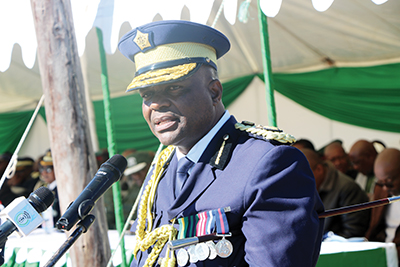By Thoboloko Ntšonyane
MASERU- The Commissioner of Police (COMPOL) Holomo Molibeli has encouraged Police officers to pursue education, a move he argued would contribute towards improved and professional policing capabilities.
This he said on Friday during the pass-out parade of the 296 Police recruits.
The incoming law enforcement officers were elevated to the rank of Police Constables and Women Police Constables by the Prime Minister Rt. Hon Samuel Matekane.
The recruits took 13 months undergoing police training. This cohort is the first to undergo that long time, according to the COMPOL who said initially police training was six months, then moved to nine months, then 11 months.
He stated that they had deployed these recruits to carry out policing duties on the streets, and they have engaged with the community and to date, no reports about their conduct have been received. “We have ensured that these individuals meet the required standards,” he affirmed.
COMPOL continued: “We have instilled in them that they are not the masters of the public but the servants”.
He said they join ranks at a time when murder rates and stock theft have escalated in the country.
The head of LMPS said Qacha’s Nek, Mokhotlong and Thaba-Tseka will each be assigned a continent of 50 police officers to reinforce police personnel there and improve policing capabilities.
He appealed to the general public to refrain from bribing these new officers, adding that they have intentions to procure body cameras that will monitor their actions on the field.
Molibeli said LMPS has established collaborative partnerships with the Rwanda National Police. This collaboration has initiatives such as exchange programmes.
He said they have sent a police officer on a rank of Superintendent and they will soon send another to do a Master’s Degree with the Rwandan Police institution.
Through these programmes, he said Rwandan police officers would visit Lesotho, and equally Lesotho police officers have the opportunity to travel to Rwanda.
These exchanges are expected to foster mutual learning, enhance professional development, and promote cooperation between these two law enforcement agencies.
He said LMPS has partnered with the National University of Lesotho (NUL) to help them shape the training curriculum which he said will be implemented in the next cohort that will undergo police training.
The Director of Police Training College (PTC) Senior Assistant Commissioner of Police (SACP) Lintle Bohang Phasumane said the pass-out parade is a milestone of every police officer following an intensive training they underwent.
“As PTC, we feel humbled and proud that we are entrusted to train men and women, to produce police officers who are well grounded, competent and ready to diligently serve the Basotho nation,” she said.
SACP said the training touches on many aspects including their spiritual, mental and physical health.
PTC Director said the trainees were taught on the organization historical background, Criminal Law, Common Laws, Penal Code, Criminal and Evidence Procedure laws including laws of evidence and all the Statutes, Protection of Human Rights and the rule of Law, Crime Management Strategies, Interviewing Techniques, Public Order Policing, Foot Drills, Arms Drill and Mounted Drill.
The PM had promised that the government would afford the police with the necessary resources to effectively discharge their duties.
Under the security reforms, in the ongoing national reforms, LMPS is one of the institutions that will be reformed in order to professionalize and depoliticize it.
LMPS, originally known as Basutoland Mounted, was established on October 26, 1872, with a force comprising 110 men, primarily the sons of local chiefs. They also assumed the role of interpreting for the magistrates.
Initially, the main responsibilities of the police were to assist and safeguard the magistrates, as well as act as interpreters and messengers. In 1878, the police adopted military ranks, which were later replaced with police ranks in 1958.
As their duties expanded, LMPS now boast specialized units such as Anti-Trafficking Unit, Criminal Investigation Department (CID), Anti-Stock Theft, Traffic Department, Forensics and Ballistics, Child and Gender Protection Unit (CGPU), Medical Department among others.


